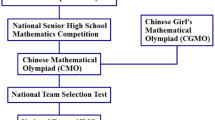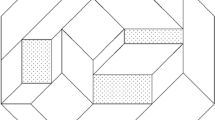Abstract
This paper belongs to a field of research that has appeared comparatively recently, namely, the study of mathematics competitions. The paper utilizes historical-theoretical methodology and is devoted to changes in the way in which mathematics competitions have been conducted in Russia in recent decades. Mathematics competitions, like mathematics education as a whole, are seen as part of a social process, and changes in them are seen as expressions of new social needs and possibilities. The analysis of the system of competitions, as it evolved in the USSR, and the literature devoted to them, makes it possible to identify certain challenges recognized by the mathematics community. In this paper I discuss examples of new competitions that have emerged to address these challenges. It is noted that new types of competitions have emerged, including team competitions and competitions involving mass participation by students. Also discussed is the emergence of new competitions with subject matter closer to that of ordinary school mathematics than that of old, traditional competitions. An analysis of the situation in Russia reveals the existence of a significant group of mathematics educators, parents, and children interested in the development of mathematics competitions. Also, in the paper I call attention to certain questions that I consider worthy of further study.
Similar content being viewed by others
Notes
All translations from Russian are by the author.
This was reported on Russian media. See, for example, https://www.youtube.com/watch?v=DLZMDT9MuHQ
References
Applebaum, M., Kondratieva, M., & Freiman, V. (2013). Mathematics competitions and gender issues: A case of the virtual marathon. Mathematics Competitions, 26(1), 23–40
Atkins, W. J., Leder, G. C., O’Halloran, P. J., Pollard, G. H., & Taylor, P. J. (1991). Measuring risk taking. Educational Studies in Mathematics, 22, 297–308
Barbeau, E. & Taylor, P. (Eds.) (2009). Challenging mathematics in and beyond the classroom (pp. 45–50). The 16th ICMI Study. Springer.
Bashmakov, M. (2010). Matematika v karmane ‘Kenguru’ [Mathematics in the ‘Kangaroo’s’ pouch]. Moscow: Drofa.
Belhoste, B. (2002). Anatomie d’un concours: L’organisation de l’examen d’admission à l’École Polytechnique de la Révolution à nos jours [Anatomy of a competition: The organization of the entrance examination to the École Polytechnique from the Revolution to the present day]. Histoire De L’education, 94, 141–175
Blinkov, A. D., Gorskaya, E. S., & Gurovits, V. M. (2007). Moskovskie matematicheskie regaty [Moscow Mathematics Regattas]. Moscow: MTsNMO.
Bratus’, T. A., Zharkovskaya, N. A., Plotkin, A. I., Savelova, T. E., & Riss, E. A. (2003). Kenguru 2003. Zadachi, resheniya, itogi [Kangoroo-2003. Problems, solutions, results]. St. Petersburg: IPO.
Choi, K. M. (2009). Characteristics of Korean International Mathematical Olympiad (IMO) winners' and various developmental influences. Unpublished doctoral dissertation. New York: Teachers College, Columbia University.
Chulkov, P. V. (Ed.). (2009). Vesennii turnir Archimeda [Spring Tournament of Archimedes]. MTsNMO.
Euler foundation. (n.d.) Olympiada Eilera uchiteley matematiki [Euler Olympiad for mathematics teachers]. Retrieved from https://www.euler-foundation.org/ on January 17, 2020.
Fomin, D. (1992). Three examples of non-standard mathematics competitions. Mathematics Competitions, 5(2), 42–52
Fomin, D. V. (1994). Sankt-Peterburgskie matematicheskie Olympiady [St. Petersburg mathematical Olympiads]. St. Petersburg: Politekhnika.
Fomin, D., Genkin, S., & Itenberg, I. (1996). Mathematical circles: Russian experience. Providence, RI: American Mathematical Society.
Geretschlӓger, R. (2017). The rainbow of mathematics—Teaching the complete spectrum and the role mathematics competitions can play. In Soifer, A. (Ed.), Competitions for young mathematicians. Perspectives from five continents (pp. 145–170). Springer.
Goncharova, M. V., Gromov, A. L., Dement’ev, A. V., Evdokimova, T. O., Kokhas’, K. P., Sukhov, K. A., & Khrabrov, A. I. (2017), Shkol’nye olympiady SPbGU. Matematika [St. Petersburg State University school Olympiads. Mathematics]. St. Petersburg: St. Petersburg University.
Gordon Győri, J., Fried, K., Köves, G., Oláh, V., & Pálfalvi, J. (2020). The traditions and contemporary characteristics of mathematics education in Hungary in the Post-Socialist era. In A. Karp (Ed.), Eastern European mathematics education in the decades of change (pp. 75–129). Springer.
Karp, A. (2003). Thirty years after: The lives of former winners of mathematical olympiads. Roeper Review, 25(2), 83–87.
Karp, A. (2009). Teaching the mathematically gifted: An attempt at a historical analysis. In R.Leikin, A. Berman, & B. Koichu (Eds.), Creativity in mathematics and the education of gifted students (pp. 11–30). Rotterdam: Sense Publishers.
Karp, A. (2010). Reforms and counter-reforms: Schools between 1917 and the 1950s. In A. Karp & B. Vogeli (Eds.), Russian mathematics education: History and world significance. (pp. 43–85). World Scientific Publishing.
Karp, A. (2011). Schools with an advanced course in mathematics and schools with an advanced course in the humanities In A. Karp, & B. Vogeli (Eds.), Russian mathematics education: Programs and practices (pp. 265–318). Hackensack, NJ: World Scientific Publishing.
Karp, A. (2020). Russian mathematics education after 1991. In A. Karp (Ed.), Eastern European mathematics education in the decades of change (pp. 173–227). Springer.
Karp, A., & Furinghetti, F. (2016). History of mathematics teaching and learning. Achievements, problems, prospects. Springer.
Karp, A., & Zvavich, L. (2011). Assessment in mathematics in Russian schools. In A. Karp & B. Vogeli (Eds.), Russian mathematics education: Programs and practices. (pp. 319–374). Hackensack, NJ: World Scientific Publishing.
Kokhas’, K. P. (2016). Sankt-Petersburgskaya olimpiada po matematike kak literaturnyi i istoricheskii pamyatnik [The St. Petersburg Olympiad in mathematics as a literary and historical document]. In K. P. Kokhas’, S. L. Berlov, F. V.Petrov, & A. I. Khrabrov, Zadachi Sankt-Peterburgskoy olympiady shkol’nikov po matematike (pp. 107–127). Moscow: MTsNMO.
Kokhas’, K. P., Berlov, S. L., Khrabrov, A. I., et al. (2018). Zadachi Sankt-Peterburgskoy olympiady shkol’nikov po matematike [Problems from the St. Petersburg mathematics Olympiad for schoolchildren]. Moscow: MTsNMO.
Kontorovich, I., & Koichu, B. (2016). A case study of an expert problem poser for mathematics competitions. International Journal of Science and Mathematics Education, 14, 81–99.
Leder, G. (2011). Mathematics taught me Einstein’s old cocktail of inspiration and perspiration: Mathematically talented teenagers as adults. Canadian Journal of Science, Mathematics and Technology Education, 11(1), 29–38
Liljedahl, P. (2019). Conditions for supporting problem-solving: Vertical non-permanent surfaces. In P. Liljedahl & M. Santos-Trigo (Eds.), Mathematical problem solving. (pp. 289–310). New York: Springer.
Marushina, A. (2016). Mathematical extracurricular activities in Russia. Unpublished doctoral dissertation. New York: Teachers College, Columbia University.
Marushina, A., & McGee, D. (2015). Russian schools for the mathematically gifted. In B. Vogeli (Ed.), International panorama of specialized secondary schools for mathematically talented. (pp. 31–47). Hackensack, NJ: World Scientific Publishing.
Marushina, A., & Pratusevich, M. (2011). Extracurricular work in Mathematics. In A. Karp & B. Vogeli (Eds.), Russian mathematics education: Programs and practices. (pp. 375–410). World Scientific Publishing.
Olympiada nachal’noy shkoly [Elementary school Olympiad] (n.d.) Retrieved from http://matolimp-spb.org/2020/. Accessed 16 Jan 2020.
Saul, M., & Fomin, D. (2010). Russian traditions in mathematics education and Russian mathematical contests. In A. Karp & B. Vogeli (Eds.), Russian mathematics education: History and world significance. (pp. 223–252). Hackensack, NJ: World Scientific Publishing.
Sgibnev, A.I, (2013). Issledovatel’skie zadachi dlya nachinaiuschikh [Research problems for beginners]. Moscow: MTsNMO.
Sharich, V. (2017). Goals and challenges of the mathematical Olympiads of today: Science, sport, university admission, or status? In A. Karp (Ed.), Current issues in mathematics education (pp. 67–78). Bedford, MA: COMAP.
Shnol, D. (2017). Mathematical research problems in Russian schools. In A. Karp (Ed.), Current issues in mathematics education (pp. 79–94). Bedford, MA: COMAP.
Soifer, A. (2010). Building a bridge III: From problems of mathematical Olympiads to open problems of mathematics. Mathematics Competitions, 23(1), 27–38
Soifer, A. (Ed.). (2017). Competitions for young mathematicians. Perspectives from five continents. New York: Springer.
Solzhenitsyn, A. (1974). The Gulag archipelago, 1918–1956; An experiment in literary investigation. New York: Harper & Row.
Sossinsky, A. (2010) Mathematicians and mathematics education: A tradition of involvement. In A. Karp & B. Vogeli (Eds.), Russian mathematics education: History and world significance (187–222). Hackensack, NJ: World Scientific Publishing.
Taylor, P. J. (2017). Future directions for research in mathematics competitions. In Soifer, A. (Ed.), Competitions for young mathematicians. Perspectives from five continents (pp. 303–328). Cham: Springer.
Tikhonov, Yu. V., & Sharich, V. Z. (2012). Komandno-lichnyi turnir shkol’nikov “Matematicheskoe mnogobor’e” 2008–2010 [Team and individual students tournament: Mathematical all-round]. MTsNMO.
Tournament of towns (n.d.). Letnie konferentsii turnira gorodov [Summer Conferences of the Tournament of Towns]. Retrieved from https://www.turgor.ru/lktg/. Accessed 17 Jan 2020.
Vasiliev, N. B., Gutenmacher, V. L., Rabbot, Zh. M., & Toom, A. L. (1981). Zaochnye mathematicheskiye Olimipiady [Mathematical Olympiads by correspondence]. Moscow: Nauka.
Volfson, G. I., Gol’khovoy, V. M., Zhigulev, L. A., Ivanov, O. A., & Nekrasov, V. B. (2013). Zadachi Olympiad Eilera [Problems from the Euler Olympiads]. St. Petersburg: Levsha.
Author information
Authors and Affiliations
Corresponding author
Additional information
Publisher's Note
Springer Nature remains neutral with regard to jurisdictional claims in published maps and institutional affiliations.
Rights and permissions
About this article
Cite this article
Marushina, A. Mathematics competitions: what has changed in recent decades. ZDM Mathematics Education 53, 1591–1603 (2021). https://doi.org/10.1007/s11858-021-01275-w
Accepted:
Published:
Issue Date:
DOI: https://doi.org/10.1007/s11858-021-01275-w




